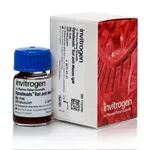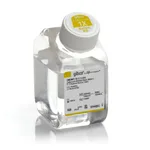
Thermo Fisher Scientific CD34 Monoclonal Antibody (4H11), FITC, eBioscience
✨AI 추천 연관 상품
AI가 분석한 이 상품과 연관된 추천 상품들을 확인해보세요
연관 상품을 찾고 있습니다...
Applications
Tested Dilution
Publications
Immunocytochemistry (ICC/IF)
-
View 2 publications 2 publications
Flow Cytometry (Flow)
5 µL (0.5 µg)/test
View 75 publications 75 publications
Miscellaneous PubMed (Misc)
-
View 2 publications 2 publications
Product Specifications
Species Reactivity
Human
Published species
Human, Mouse
Host/Isotype
Mouse / IgG1, kappa
Recommended Isotype Control
Mouse IgG1 kappa Isotype Control (P3.6.2.8.1), FITC, eBioscience™
Class
Monoclonal
Type
Antibody
Clone
4H11
Conjugate
FITC FITC FITC
View additional formats
- Unconjugated
- Alexa Fluor 700
- APC
- APC-eFluor 780
- Biotin
- eFluor 450
- PE
- PE-Cyanine5
- PE-Cyanine7
- PE-eFluor 610
- PerCP-eFluor 710
- Super Bright 600
- Super Bright 645
- Request custom conjugation
Excitation/Emission Max
498/517 nm View spectra 
Form
Liquid
Concentration
5 µL/Test
Purification
Affinity chromatography
Storage buffer
PBS, pH 7.2, with 0.2% BSA
Contains
0.09% sodium azide
Storage conditions
4° C, store in dark, DO NOT FREEZE!
Shipping conditions
Ambient (domestic); Wet ice (international)
RRID
AB_1518733
Product Specific Information
Description: The 4H11 monoclonal antibody reacts with human CD34, also known as mucosialin. CD34 belongs to a protein family which also includes endoglycan and podocalyxin. Members of this family are single pass transmembrane proteins with a heavily glycosylated extracellular and N-terminal mucin domain. CD34 was first identified as an antigen expressed on hematopoietic progenitors, and has since been extensively used as a marker to isolate cells capable of hematopoietic cell engraftment. In spite of this, the function of CD34 remains unresolved. In addition to expression on hematopoietic progenitors, CD34 is expressed on some populations of mesenchymal stem cells, tumor cell lines, and by vascular endothelia in the adult. Epitopes of CD34 have been assigned to three classes (class I, II or III) based on their differential sensitivity to enzymatic cleavage by neuraminidase, chymopapain, or O-glycoprotease. According to this analysis, the 4H11 antibody belongs to class III, indicating that it reacts with a protein epitope.
Applications Reported: This 4H11 antibody has been reported for use in flow cytometric analysis.
Applications Tested: This 4H11 antibody has been pre-titrated and tested by flow cytometric analysis of normal human peripheral blood cells. This can be used at 5 µL (0.5 µg) per test. A test is defined as the amount (µg) of antibody that will stain a cell sample in a final volume of 100 µL. Cell number should be determined empirically but can range from 10^5 to 10^8 cells/test.
Excitation: 488 nm; Emission: 520 nm; Laser: Blue Laser.
Filtration: 0.2 µm post-manufacturing filtered.
Target Information
CD34 is a highly glycosylated monomeric with a molecular weight range of 111-115 kDa surface protein that is present on many stem cell populations. CD34 is a stem cell marker although its expression on human hematopoietic stem cells is reversible. CD34 may serve as a surface receptor that undergoes receptor-mediated endocytosis and regulates adhesion, differentiation and proliferation of hematopoietic stem cells and other progenitors. CD34 expression is likely to represent a specific state of hematopoietic development that may have altered adhering properties with expanding and differentiating capabilities in both in vitro and in vivo conditions. CD34 is possibly an adhesion molecule with a putative role for mediating the attachment of stem cells to the bone marrow extracellular matrix or directly to stromal cells. Further, CD34 could act as a scaffold for the attachment of lineage specific glycans, allowing stem cells to bind to lectins expressed by stromal cells or other marrow components. CD34 is thought to have a role in presenting carbohydrate ligands to selectins. The intracellular chain of the CD34 antigen is a site of phosphorylation by activated protein kinase C suggesting a putative role in signal transduction. Diseases associated with CD34 dysfunction include dermatofibrosarcoma and neurofibroma.
For Research Use Only. Not for use in diagnostic procedures. Not for resale without express authorization.
🏷️Thermo Fisher Scientific 상품 둘러보기
동일 브랜드의 다른 상품들을 확인해보세요

Thermo Fisher Scientific
Thermo Fisher Scientific CD34 Monoclonal Antibody (RAM34), FITC, eBioscience
164,300원

Thermo Fisher Scientific
Thermo Fisher Scientific Dynabeads Rat Anti-Mouse IgM
1,203,400원

Thermo Fisher Scientific
Thermo Fisher Scientific CD34 Monoclonal Antibody (4H11), FITC, eBioscience
181,900원

Thermo Fisher Scientific
Thermo Fisher Scientific DMEM/F-12, HEPES, no phenol red, 500 mL
82,200원

Thermo Fisher Scientific
Thermo Fisher Scientific CD31 (PECAM-1) Monoclonal Antibody (WM-59 (WM59)), FITC, eBioscience
147,700원
배송/결제/교환/반품 안내
배송 정보
| 기본 배송비 |
| 교환/반품 배송비 |
|
|---|---|---|---|
| 착불 배송비 |
| ||
| 교환/반품 배송비 |
| ||
결제 및 환불 안내
| 결제수단 |
|
|---|---|
| 취소 |
|
| 반품 |
|
| 환급 |
|
교환 및 반품 접수
| 교환 및 반품 접수 기한 |
|
|---|---|
| 교환 및 반품 접수가 가능한 경우 |
|
| 교환 및 반품 접수가 불가능한 경우 |
|
교환 및 반품 신청
| 교환 절차 |
|
|---|---|
| 반품 절차 |
|
